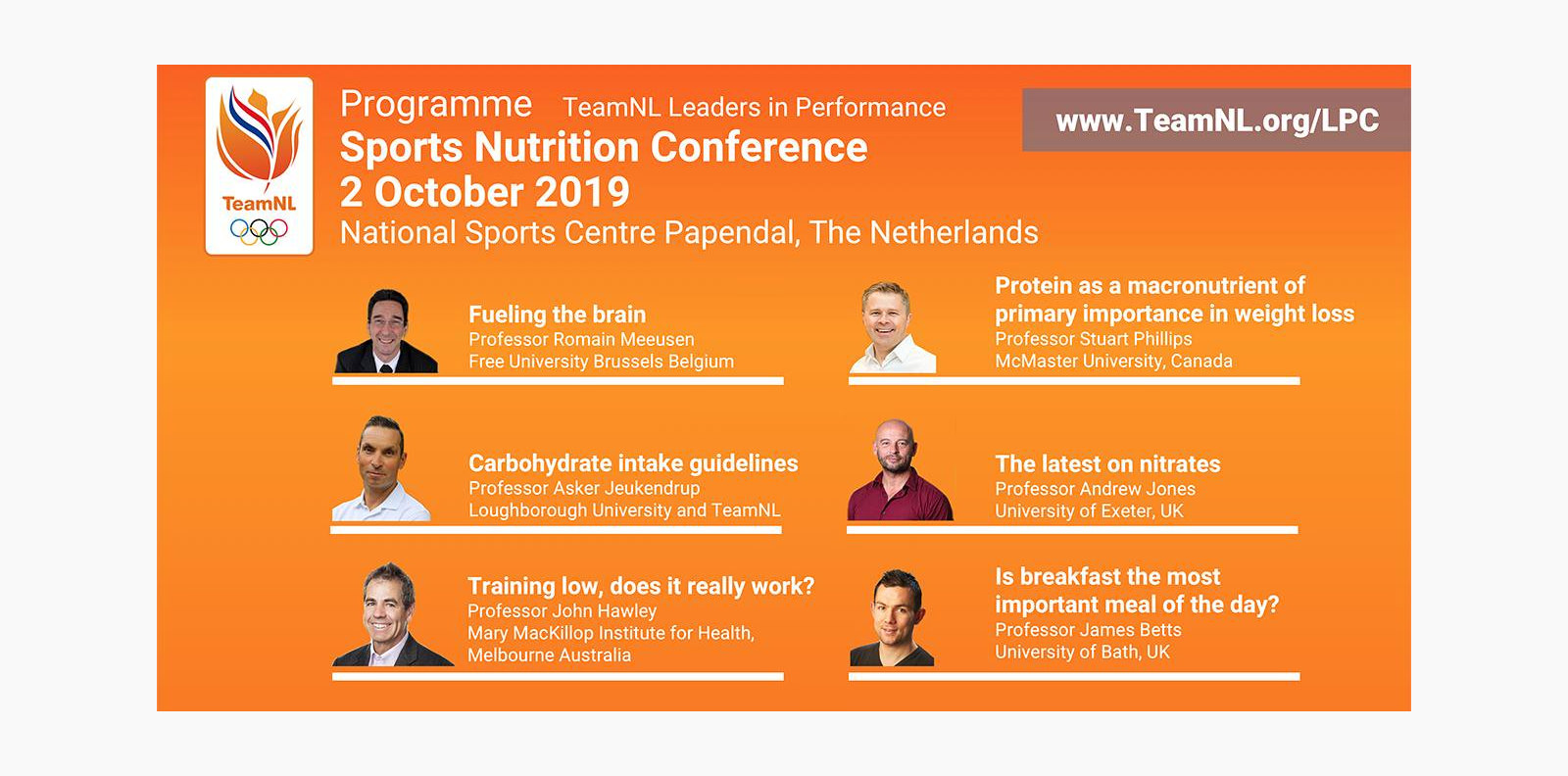Leaders in Performance Conference Report

Last month, 6d Sports Nutrition attended the "Leaders in Performance Conference: Sports Nutrition" at the Olympic Training Centre Papendal in the Netherlands. At this annual conference, various international top scientists presented the latest updates from a wide range of specialisations in nutritional science to sports dietitians, scientists, coaches and people from the business community. 6d attended the conference to acquire more knowledge and to become acquainted with Dutch experts in the field. A detailed report on the day is set out below.
"Brain food" – Prof. dr. Meeusen
The day started with a lecture by Prof. dr. Meeusen about the role of nutrition on our brains and possible ways of improving sports performance through nutrition. More specifically:
- The important role glucose plays as fuel for the brain. The intake of sufficient carbohydrates before and during physical activity can counter fatigue. This helps to retain focus and sport-specific techniques after high-intensity physical activity.
- Rinsing your mouth with a carbohydrate-rich liquid immediately before or during physical activity releases more energy to the brain because a direct connection is formed between the mouth and brain. This results in an improvement in performance during a broad range of intense physical activities, such as a football match or a time trial.
- Caffeine may also have a performance-enhancing effect for both (prolonged) endurance exercise and short, high-intensity efforts due to stimulation of the brain and the central nervous system. Caffeine gum is absorbed directly through the lining of the mouth (oral mucosa), which means that it has a much faster effect than other caffeine products.
- The influence on neurotransmitters on the brain, such as tyrosine and dopamine, has not been investigated sufficiently and may even be harmful because they cause a rapid increase in body temperature.
Guidelines for the intake of carbohydrates – Prof. dr. Jeukendrup
After this, Prof. dr. Jeukendrup shared the most recent scientific developments concerning the intake of carbohydrates for different types of physical activities. The most significant conclusions were as follows:
- Carbohydrates are the most important fuel during (intense) physical activity and the precise intake depends on the duration and intensity of the activity.
- Fixed guidelines for this intake form a good starting point, but these guidelines always need to be adjusted based on a specific individual situation. Aside from duration and intensity, factors such as individual tolerance, the simultaneous intake of fluids, and the practical situation during training or competition also need to be taken into account.
- In order to perform at the highest level during prolonged endurance exercise (>3 hours), an intake of carbohydrates of up to 90 grams per hour is advised. However, this can only be absorbed by the intestines when several sources of carbohydrates are combined. Ideally, a glucose/fructose ratio of 2:1 ensures maximum uptake.
- Furthermore, when optimal short-term recovery is the goal, this 2:1 ratio in a recovery drink ensures a more efficient replenishment of liver glycogen.
"Training low" – Does it really work? – Prof. dr. Hawley
After this, Prof. dr. Hawley discussed the advantages of "training low", where the muscle glycogen levels are kept intentionally low during and/or after training. The most important message was:
- "Training low" is an effective way to improve endurance performance in physical activities lasting longer than one hour.
- This type of training increases "metabolic stress" in the body, which "stimulates" certain genes that take care of increased training adaptation. For example, this results in an increase in the production of mitochondria (= the body's "power plants"), which can improve endurance exercise performance.
- "Training low" can be applied in different ways, but it is important that it is always applied in the preparatory stages of the season and that it also does not reduce the total training quality.
The importance of protein during a period of weight loss – Prof. dr. Philips
Prof. dr. Philips then elaborate on the importance of protein during a period of weight loss. The most important topics from his lecture were as follows:
- Protein is very important nutrient when you are trying to lose weight, because they offer a lot of satiety, relatively require the most calories to digest, protein-rich nutrition generally contains many other healthy nutrients, and protein is also critical for maintaining muscle mass (thus only losing body fat).
- A special role is reserved for the amino acid leucine, because it can further stimulate muscle protein synthesis. Because whey protein is naturally rich in leucine, this is the best protein to stimulate muscle protein synthesis. For plant-based proteins, this specifically refers to proteins from peas and rice.
- Aside from the role protein plays during a weight loss period, the importance of strength training should not be underestimated: during a period of very strict calorie restriction, muscle mass can be gained by combining (very) high-protein nutrition and sufficient strength training.
- Finally, dr. Philips emphasised that there is no scientific basis whatsoever for the claims that are often made concerning the damaging effect that high protein intakes might have on the liver and kidneys.
The most recent state of affairs concerning nitrates – Prof. dr. Jones
Professor Jones, an expert on the performance enhancing effects of nitrates, then provided an update on the latest scientific developments in this field.
- Even though the effects on top athletes are smaller than on recreational athletes, nitrates increase oxygen efficiency in the muscles. This can cause performance enhancements during submaximal endurance activities, but also during activities with repeated sprints.
- Furthermore, recent research has shown that muscles can act as a nitrate reservoir: in periods of increased intake, nitrates can be stored in the muscles, and in periods of reduced intake, nitrates can be released from the muscles.
- Moreover, it appears that nitrate supercompensation may also take place during this storage. This means that supplies of nitrates in the muscles are fully depleted first, after which a very large intake of nitrates causes the muscles to act as a sponge and "absorb" the nitrates, (temporarily) increasing the storage capacity.
Is breakfast the most important meal of the day? – Prof. dr. Betts
Professor Betts was the final speaker and his presentation was about the facts and myths surrounding the importance of breakfast. His key conclusions were as follows:
- People who structurally eat breakfast, (unknowingly) are more active during the morning. Specifically, this involves very light forms of exercise, such as short walks.
- People who have breakfast and thereby increase the number of meals they have during the day, generally live longer and healthier.
- However, this does not mean that eating breakfast (or skipping it) is by definition good: this depends on the total dietary and physical activity pattern and should therefore be assessed per situation.
- For athletes, however, it is generally not advisable to skip breakfast. This may be problematic for protein distribution and/or energy supply for optimal performance and recovery.
Speed updates
During the "speed update" sessions, the nutritional experts present provided updates on a variety of topics, including:
- Night protein: Having a protein-rich snack before bedtime improves both the total protein intake as well as the equal distribution of protein during the day . This requires a large portion of protein, preferably 40 grams of high-grade protein.
- Caffeine gum: Caffeine in chewing gum is absorbed directly by the buccal mucosa, which can have a rapid and performance-improving effect.
- Protein-rich diet: hype?: Even though an increased amount of protein intake within a varied dietary pattern may contribute to losing weight, a high protein intake is not healthy by definition. Therefore, it is important to implement this as part of a balanced nutritional pattern.
- HMB: HMB has been a hype in the fitness and bodybuilder world, but there is a scientific consensus that this supplement has no effect. Only leucine can create an additional muscle-building stimulus.


